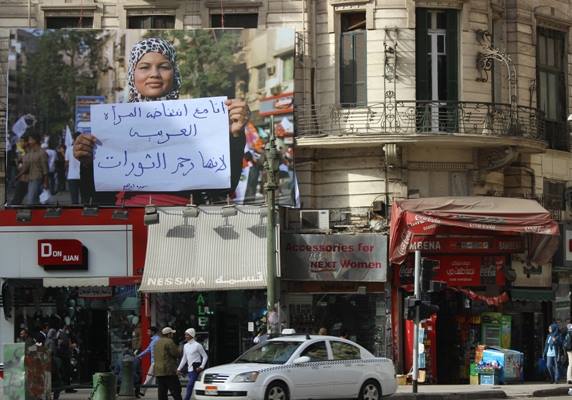Latest NEWS
- Aswat Masriya, the last word
- Roundup of Egypt's press headlines on March 15, 2017
- Roundup of Egypt's press headlines on March 14, 2017
- Former Egyptian President Hosni Mubarak to be released: lawyer
- Roundup of Egypt's press headlines on March 13, 2017
- Egypt's capital set to grow by half a million in 2017
- Egypt's wheat reserves to double with start of harvest -supply min
- Roundup of Egypt's press headlines on March 12, 2017
“Virginity test” activist contests parliament seat in Sohag

CAIRO, Oct. 18 (Aswat Masriya) – Outspoken activist Samira Ibrahim, known for the “virginity test” scandal is running in the the 2015 parliamentary race amid criticism from the boycott camp.
Ibrahim, then a relatively unknown 24-year-old from Upper Egypt, shot to local and international fame when she filed a lawsuit against a military doctor for subjecting her to a “virginity test” in March 2011 when she was detained after a violent dispersal of a sit-in in Tahrir Square.
After initially denying that virginity tests had taken place, then senior army general Abdel Fattah al-Sisi, now Egypt's president, admitted in May 2011 that at least 17 women had been forced to undergo the tests, telling Amnesty International that they had been carried out on female detainees to "protect" the army against possible rape allegations.
In December of the same year, an Egyptian court banned virginity tests for female detainees, but in March 2012 a court ruling acquitted the doctor implicated in the case.
Ibrahim is running as an independent candidate in Sohag, one of 14 provinces going to the polls in the first phase of legislative elections which end tomorrow.
She is one of only four women competing with 220 males candidates over one of 28 seats up for grabs in the individual system in Sohag which boasts over 2.5 million eligible voters.
Ibrahim’s participation was criticized by the boycott camp on social media. One critic asked who is funding her campaign, while another questioned how Ibrahim, who was subjected to a virginity test, would participate in what is implied is no more than window-dressing for the regime which conducted this humiliating test.
In response, Ibrahim, whose electoral symbol is a candle, said that "to light a candle is better than to curse the dark."
Magda Adly, head of the Nadeem Center for the Rehabilitation of Victims of Violence which supports battered women, and who had adopted Ibrahim's case then, supported her right to participate.
While she contended that the youth boycott betrayed a lack of confidence in that the incoming parliament will help them realize the dreams they fought for in January 2011, she says that we shouldn’t follow the logic of "you're either with us or against us" as long as you believe in personal freedom.










